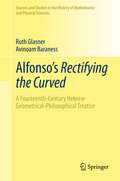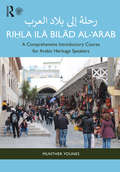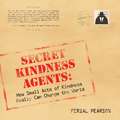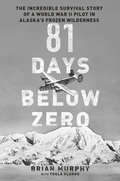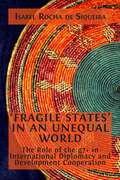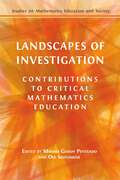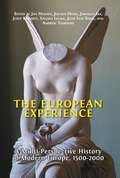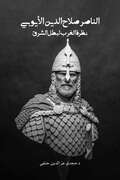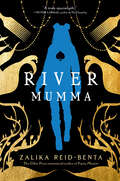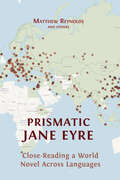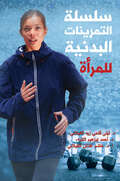- Table View
- List View
Alfonso's Rectifying the Curved: A Fourteenth-Century Hebrew Geometrical-Philosophical Treatise (Sources and Studies in the History of Mathematics and Physical Sciences)
by Ruth Glasner Avinoam BaranessThis volume offers a new English translation, introduction, and detailed commentary on Sefer Meyasher 'Aqov, (The Rectifying of the Curved), a 14th-century Hebrew treatise on the foundation of geometry. The book is a mixture of two genres: philosophical discussion and formal, Euclidean-type geometrical writing. A central issue is the use of motion and superposition in geometry, which is analyzed in depth through dialog with earlier Arab mathematicians. The author, Alfonso, was identified by Gita Gluskina (the editor of the 1983 Russian edition) as Alfonso of Valladolid, the converted Jew Abner of Burgos. Alfonso lived in Castile, rather far from the leading cultural centers of his time, but nonetheless at the crossroad of three cultures. He was raised in the Jewish tradition and like many Sephardic Jewish intellectuals was versed in Greek-Arabic philosophy and science. He also had connections with some Christian nobles and towards the end of his life converted to Christianity. Driven by his ambition to solve the problem of the quadrature of the circle, as well as other open geometrical problems, Alfonso acquired surprisingly wide knowledge and became familiar with several episodes in Greek and Arabic geometry that historians usually consider not to have been known in the West in the fourteenth century. Sefer Meyasher 'Aqov reflects his wide and deep erudition in mathematics and philosophy, and provides new evidence on cultural transmission around the Mediterranean.
Riḥla ilā Bilād al-‘Arab رحلة إلى بلاد العرب: A Comprehensive Introductory Course for Arabic Heritage Speakers
by Munther YounesRiḥla ilā Bilād al-‘Arab starts with the Arabic alphabet and gradually and systematically builds the reading and writing skills and mastery of Fuṣḥā grammar. As students develop their reading, writing, and grammar skills, they will be learning about Arab history, society, and culture. This book contextualizes Arabic grammar teaching with sufficient and relevant drills and exercises. Added personal and cultural interest is given by the diary of Amal, an American student of Arab descent, who travels to Jordan and Palestine. This textbook includes maps, illustrations, and photographs and is accompanied by audio on the companion website that can be viewed here: www.routledge.com/cw/younes . The book is designed for Arabic heritage students—students who can understand and speak an Arabic dialect (Egyptian, Iraqi, Moroccan, etc.) but are unfamiliar with Modern Standard Arabic, known as Fuṣḥā.
Secret Kindness Agents: How Small Acts Of Kindness Really Can Change The World
by Ferial PearsonSometimes the small things make all the difference. Moved by the Sandy Hook Elementary School tragedy, Ferial Pearson wondered if a simple act of kindness could change a life. She thought of the school where she taught and the students she guided every day and wondered, what would happen if we started secretly carrying out small acts of kindness in school? Could a modest act of compassion really change the course of a life? She posed the question to her students. They didn’t have the answers but they were willing to find out. And so they became the Secret Kindness Agents. They not only changed the lives of those they met, they changed their own. Their hope, their hearts, and their hunger for happiness will inspire you to change your small corner of the world, in your own way, for the better. Let them show you how they did it, and how you can do the same.
81 Days Below Zero: The Incredible Survival Story of a World War II Pilot in Alaska's Frozen Wilderness
by Brian MurphyShortly before Christmas in 1943, five Army aviators left Alaska’s Ladd Field on a test flight. Only one ever returned: Leon Crane, a city kid from Philadelphia with little more than a parachute on his back when he bailed from his B-24 Liberator before it crashed into the Arctic. Alone in subzero temperatures, Crane managed to stay alive in the dead of the Yukon winter for nearly twelve weeks and, amazingly, walked out of the ordeal intact. 81 Days Below Zero recounts, for the first time, the full story of Crane’s remarkable saga. In a drama of staggering resolve with moments of phenomenal luck, Crane learned to survive in the Yukon’s unforgiving landscape. His is a tale of the human capacity to endure extreme conditions and intense lonelinessand emerge stronger than before.
Studies in Rabbinic Hebrew
by Shai HeijmansThis volume presents a collection of articles centring on the language of the Mishnah and the Talmud – the most important Jewish texts (after the Bible), which were compiled in Palestine and Babylonia in the latter centuries of Late Antiquity. Despite the fact that Rabbinic Hebrew has been the subject of growing academic interest across the past century, very little scholarship has been written on it in English. Studies in Rabbinic Hebrew addresses this lacuna, with eight lucid but technically rigorous articles written in English by a range of experienced scholars, focusing on various aspects of Rabbinic Hebrew: its phonology, morphology, syntax, pragmatics and lexicon. This volume is essential reading for students and scholars of Rabbinic studies alike, and constitutes the first in a new series, Studies in Semitic Languages and Cultures, in collaboration with the Faculty of Asian and Middle Eastern Studies at the University of Cambridge.
With and Without Galton: Vasilii Florinskii and the Fate of Eugenics in Russia
by Nikolai KrementsovIn 1865, British polymath Francis Galton published his initial thoughts about the scientific field that would become ‘eugenics.’ The same year, Russian physician Vasilii Florinskii addressed similar issues in a sizeable treatise, entitled Human Perfection and Degeneration. Initially unheralded, Florinskii’s book would go on to have a remarkable afterlife in twentieth- and twenty-first-century Russia. <p><p> In this lucid and insightful work, Nikolai Krementsov argues that the concept of eugenics brings together ideas, values, practices, and fears energised by a focus on the future. It has proven so seductive to different groups over time because it provides a way to grapple with fundamental existential questions of human nature and destiny. With and Without Galton develops this argument by tracing the life-story of Florinskii’s monograph from its uncelebrated arrival amid the Russian empire’s Great Reforms, to its reissue after the Bolshevik Revolution, its decline under Stalinism, and its subsequent resurgence: first, as a founding document of medical genetics, and most recently, as a manifesto for nationalists and racial purists. <p> Krementsov’s meticulously researched ‘biography of a book’ sheds light not only on the peculiar fate of eugenics in Russia, but also on its convoluted transnational history, elucidating the field’s protean nature and its continuing and contested appeal to diverse audiences, multiple local trajectories, and global trends. It is required reading for historians of eugenics, science, medicine, education, literature, and Russia, and it will also appeal to the general reader looking for a deeper understanding of this challenging subject.
‘Fragile States’ in an Unequal World
by Isabel Rocha de SiqueiraThis is a book about people. ‘Fragile States’ in an Unequal World: The Role of the g7+ in International Diplomacy and Development Cooperation introduces the members of the g7+, a group formed by 20 conflict-affected states: why they came to believe in politics and policy; how they feel about their work, their family and their communities; and what they want to leave behind for the next generations It is the story of their personal and collective values, their mistakes, and the challenges they faced, and it will resonate with anyone who has tried to organize and work with a group of very different people.
Landscapes of Investigation: Contributions to Critical Mathematics Education
by Miriam Godoy Penteado and Ole SkovsmoseCreating landscapes of investigation is a primary concern of critical mathematics education. It enables us to organise educational processes so that students and teachers are able to get involved in explorations guided by dialogical interactions. It attempts to address explicit or implicit forms of social injustice by means of mathematics, and also to promote a critical conception of mathematics, challenging the assumption that the subject represents objectivity and neutrality. Landscapes of Investigation provides many illustrations of how this can be done in primary, secondary, and university education. It also illustrates how exploring landscapes of investigation can contribute to mathematics teacher education programmes.
The European Experience
by Jan Hansen;Jochen Hung;Jaroslav Ira;Judit Klement;Sylvain Lesage;Juan Luis Simal;Andrew TompkinsThe European Experience brings together the expertise of nearly a hundred historians from eight European universities to internationalise and diversify the study of modern European history, exploring a grand sweep of time from 1500 to 2000.
A Relational Realist Vision for Education Policy and Practice
by Basem AdiThis volume argues that relational realism can help us to make better educational policy that is more effective in practice. Basem Adi draws on critical realism to thoroughly re-examine fundamental assumptions about how government policymaking works, developing an ontological basis from which to examine existing government approaches and imagine an alternative approach based on a relational realist-informed critical pedagogy.
William Moorcroft, Potter: Individuality by Design
by Jonathan MallinsonWilliam Moorcroft (1872-1945) was one of the most celebrated potters of the early twentieth century. His career extended from the Arts and Crafts movement of the late Victorian age to the Austerity aesthetics of the Second World War. Rejecting mass production and patronised by Royalty, Moorcroft’s work was a synthesis of studio and factory, art and industry. He considered it his vocation to create an everyday art, both functional and decorative, affordable by more than a privileged few: ‘If only the people in the world would concentrate upon making all things beautiful, and if all people concentrated on developing the arts of Peace, what a world it might be,’ he wrote in a letter to his daughter in 1930.
Toevallige ontmoetingen: Bio-ethiek voor een gehavende planeet
by Kristien HensIn dit rigoureuze en noodzakelijke boek brengt Kristien Hens bio-ethiek en filosofie van de biologie bij elkaar, met het argument dat het ethisch noodzakelijk is om in het wetenschappelijk onderzoek een plaatsje vrij te houden voor de filosofen. Hun rol is behalve ethisch ook conceptueel: zij kunnen de kwaliteit en de coherentie van het wetenschappelijk onderzoek verbeteren door erop toe te zien dat specifieke concepten op een consistente en doordachte manier worden gebruik binnen interdisciplinaire projecten. Hens argumenteert dat toeval en onzekerheid een centrale rol spelen in de bio-ethiek, maar dat die in een spanningsrelatie kunnen raken met de pogingen om bepaalde theorieën ingang te doen vinden als wetenschappelijke kennis: bij het beschrijven van organismen en praktijken creëren we op een bepaalde manier de wereld. Hens stelt dat dit noodzakelijk een ethische activiteit betreft.
الناصر صلاح الدين الأيوبي: نظرة الغرب لبطل الشرق (Studies In The History And Anthropology Of Religion Ser. #1)
by د.مجدي عز الدين حنفيهذا الكتاب يبرز نبذة مختصرة عن حياة القائد صلاح الدين الأيوبي. أردتُ أن أُظهِر رؤية الغرب لصفات ومميِّزات وعيوب هذه الشخصية الأسطورية المسلمة مِن خلال ترجمة مصادر إنجليزية وفرنسية عديدة، وكذلك استشارة مصادر عربية فيما يتعلَّق ببعض التفاصيل التاريخية والدينية، وبذلك تتعدَّد زوايا قراءة تاريخه. أبهرني إظهارهم للحقيقة بدون مبالغة، وتقييمهم ونقدهم البَنَّاء، فإذا كان هذا رأي الغرب (الصليبيِّين) فيه، فما بالك بحقيقة شخصيَّته مِن وجهة نظر معاصِريه؟ توجد مساحات لَم يسلَّط عليها الضوء في سيرته الذاتية، نعلم الكثير عن إنجازاته، ونعلم القليل عن شخصيَّته، مثله مثل غيره مِن حُكَّام العصور الوسطى. الفصول الثلاثة الأخيرة مِن الكتاب تتناول ما نستطيع أن نتعلَّمه مِن هذه الشخصيَّة، وكيف يمكننا الاستفادة مِن أخلاقه وأفعاله.. أرجو مِن الله أن تتمتَّعوا وتستفيدوا مِن هذا العمل.
River Mumma
by Zalika Reid-BentaIssa Rae’s Insecure with a magical realist spin: River Mumma is an exhilarating contemporary fantasy novel about a young Black woman who navigates her quarter-life-crisis while embarking on a mythical quest through the streets of Toronto. Alicia has been out of grad school for months. She has no career prospects and lives with her mom, who won’t stop texting her macabre news stories and reminders to pick up items from the grocery store. Then, one evening, the Jamaican water deity, River Mumma, appears to Alicia, telling her that she has twenty-four hours to scour the city for her missing comb. Alicia doesn’t understand why River Mumma would choose her. She can’t remember all the legends her relatives told her, unlike her retail co-worker Heaven, who can reel off Jamaican folklore by heart. She doesn’t know if her childhood visions have returned, or why she feels a strange connection to her other co-worker Mars. But when the trio are chased down by malevolent spirits called duppies, they realize their tenuous bonds to each other may be their only lifelines. With the clock ticking, Alicia’s quest through the city broadens into a journey through time—to find herself and what the river carries. Energetic and invigorating, River Mumma is a vibrant exploration of diasporic community and ancestral ties, and a homage to Jamaican folklore by one of the most invigorating voices in today’s literature.
Prismatic Jane Eyre: Close-Reading a World Novel Across Languages
by Matthew Reynolds OthersJane Eyre, written by Charlotte Brontë and first published in 1847, has been translated more than five hundred times into over sixty languages. Prismatic Jane Eyre argues that we should see these many re-writings, not as simple replications of the novel, but as a release of its multiple interpretative possibilities: in other words, as a prism. Prismatic Jane Eyre develops the theoretical ramifications of this idea, and reads Brontë’s novel in the light of them: together, the English text and the many translations form one vast entity, a multilingual world-work, spanning many times and places, from Cuba in 1850 to 21st-century China; from Calcutta to Bologna, Argentina to Iran. Co-written by many scholars, Prismatic Jane Eyre traces the receptions of the novel across cultures, showing why, when and where it has been translated (and no less significantly, not translated – as in Swahili), and exploring its global publishing history with digital maps and carousels of cover images. Above all, the co-authors read the translations and the English text closely, and together, showing in detail how the novel’s feminist power, its political complexities and its romantic appeal play out differently in different contexts and in the varied styles and idioms of individual translators. Tracking key words such as ‘passion’ and ‘plain’ across many languages via interactive visualisations and comparative analysis, Prismatic Jane Eyre opens a wholly new perspective on Brontë’s novel, and provides a model for the collaborative close-reading of world literature. Prismatic Jane Eyre is a major intervention in translation and reception studies and world and comparative literature. It will also interest scholars of English literature, and readers of the Brontës.
Divine Style: Walt Whitman and the King James Bible
by F. W. Dobbs-AllsoppIn exploring the seminal works of Walt Whitman, the great American poet, many commentators have acknowledged the underlying influence of The King James Bible. However, a study has yet to elucidate the precise manner in which the Bible has shaped Whitman’s poetic style. This is the deficit that F. W. Dobbs-Allsopp seeks to address in his new piece of literary scholarship: 'Divine Style: Walt Whitman and the King James Bible'. Dobbs-Allsopp, Professor of Old Testament at Princeton Theological Seminary, explicitly approaches Whitman from the perspective of a biblical scholar. Utilising his wealth of expertise in this field, he constructs a compelling, erudite and methodical argument for the King James Bible’s importance in the evolution of Whitman’s style – from his signature long lines to the prevalence of parallelism and tendency towards parataxis in his works. 'Divine Style' focuses on Whitman’s output in the years preceding the release of his 1855 opus 'Leaves of Grass' through the general period of the book’s first three editions. In this, Dobbs-Allsopp’s exploration of the period is exhaustive – covering not just Leaves of Grass but recently recovered notebooks, newly digitised manuscripts and additions to the corpus, such as the novel 'Life and Adventures of Jack Engle'. This is a work of careful, detailed scholarship, offering an authoritative commentary that will be a valuable resource for students of Whitman, biblical scholars and scholars of literature more generally.
Genetic Inroads into the Art of James Joyce
by Hans Walter GablerThis book is a treasure trove comprising core writings from Hans Walter Gabler‘s seminal work on James Joyce, spanning fifty years from the analysis of composition he undertook towards a critical text of A Portrait of the Artist as a Young Man, through the Critical and Synoptic Edition of Ulysses, to Gabler‘s latest essays on (appropriately enough) Joyce’s sustained artistic innovation. Not only does this span of essays trace the evolution of Gabler’s thinking about Joyce’s originality and creative energy. It also reflects the development and maturation of Gabler‘s own genetic criticism and his methodology of genetic editing, which grows in depth and complexity across the collection. The reader will explore Joyce’s life and works through Gabler’s incisive eye, while also examining a progress of his reflections on his edition of Ulysses and the past controversy that beset it. This classic compendium combining well-seasoned scholarship and fresh criticism is an essential read for critics of Modernism, digital humanists, scholars and students of James Joyce, and anyone interested in the art of literary analysis.
Translating Russian Literature in the Global Context
by Muireann Maguire Cathy McAteerTranslating Russian Literature in the Global Context examines the translation and reception of Russian literature as a world-wide process. This volume aims to provoke new debate about the continued currency of Russian literature as symbolic capital for international readers, in particular for nations seeking to create or consolidate cultural and political leverage in the so-called ‘World Republic of Letters’. It also seeks to examine and contrast the mechanisms of the translation and uses of Russian literature across the globe. This collection presents academic essays, grouped according to geographical location, by thirty-seven international scholars. Collectively, their expertise encompasses the global reception of Russian literature in Europe, the Former Soviet Republics, Africa, the Americas, and Asia. Their scholarship concentrates on two fundamental research areas: firstly, constructing a historical survey of the translation, publication, distribution and reception of Russian literature, or of one or more specific Russophone authors, in a given nation, language, or region; and secondly, outlining a socio-cultural microhistory of how a specific, highly influential local writer, genre, or literary group within the target culture has translated, transmitted, or adapted aspects of Russian literature in their own literary production. Each section is prefaced with a short essay by the co-editors, surveying the history of the reception of Russian literature in the given region. Considered as a whole, these chapters offer a wholly new overview of the extent and intercultural penetration of Russian and Soviet literary soft power during the twentieth and twenty-first centuries. This volume will open up Slavonic Translation Studies for the general reader, the student of Comparative Literature, and the academic scholar alike.
سلسلة التمرينات البدنية للمرأة
by د. ليلى فتحي زيد الكيلاني, د. أحمد إبراهيم التايه, ا. د. هاشم عدنان الكيلانيكتاب "سلسلة التمرينات البدنية للمرأة". تُعدّ التمرينات البدنية للمرأة على اختلاف أنواعها في الملعب أو بداخل الوسط المائي؛ إحدى دعائم صحة الجسد والعقل والروح. وتعد أسلوبًا واعيًا للتعامل مع جسم المرأة والاستعداد لحملٍ صحيٍّ وجيلٍ سليم. فالأمم تتنافس في صحة مجتمعاتها المبنيَّة على صحة المرأة قبل فترة الحمل وخلالها وبعد الولادة، لإنجاب أطفالٍ أقوياء أصحّاء قادرين على تكوين لبِنات البلاد ودعم اقتصادها. إن التطور في حجم الجنين يرتبط بتغيُّراتٍ فسيولوجيةٍ تتناسبُ واحتياجاتِ جسم المرأة وجنينها للحركة لما تضيفه لهما من صحةٍ وقوةٍ من دون التعرض للخطورة. وعليه؛ يوضح سلسلةً من التمرينات وبرنامجًا تدريبيًا منهجيًا يتناول إرشاداتٍ تستفيد منه كلٌّ من مدرّسات هيئة التدريس، وطالبات العلوم البدنية ومدربات اللياقة، والسيدات في شهور الحمل التسعة وفي فترة ما بعد الولادة، مدعَّمًا بالصور التوضيحية لطريقة الممارسة السليمة والتنبيهات عن الممارسات الحركية الخاطئة.
Tangible and Intangible Heritage in the Age of Globalisation
by Lilia MakhloufiTangible and Intangible Heritage in the Age of Globalisation is a rich collection that illuminates the complex interrelationships between tangible and intangible heritage. Offering a close and critical examination of heritage preservation in countries including Algeria, Bosnia and Herzegovina, Chile, Egypt, Iran, Japan, Morocco, Oman, Syria and Tunisia, these essays illustrate the need to redefine heritage as an interdisciplinary and intercultural concept. They interrogate heritage paradigms while also providing concrete recommendations to promote the preservation of physical heritage spaces, and the cultural practices and social relationships that depend on them. Rich in detail and broad in relevance, this book emphasises specific cultural realities while also reflecting on the impact of global historical, social, economic and political trends to heritage conservation, scrutinising the conditions of the past to adapt them to the needs of the present and future. It will be of great relevance to all those interested in the preservation and management of heritage sites, including architects, urban planners, landscape architects, historians, sociologists and archaeologists, as well as heritage marketing, museum and cultural tourism professionals.
